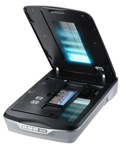
abeMeda
The File Is Out There
Digital Archiving
24 July 2009 Placed in: Related
News
Here in Germany, we just witnessed how
some old houses collapsed and disappeared down a trench as a
landslide occurred into the nearby lake. Just back in March, the
communal archive in Cologne fell down into an underground tunnel,
and tore the neighboring buildings with it. But unfortunately fires
or floods claiming lives and buildings occur all over the world,
all the time.
Events like these always leave me speechless, and pondering. About how it must feel to look at the ruins of your own home. Or just be evacuated and not allowed to enter it again because it may be unstable. How it must feel, after barely escaping alive, to have lost everything - in addition to material losses, all your memories are lost as well. No more photos or family videos, documents, letters or postcards, that helped you remember. And sometimes it’s not only your own memories that are lost - I have inherited a whole cabinet of material from my parents and grandparents, that contain precious memories for me as well.
While institutions like the communal archive can spend millions on protecting and saving their assets (physically as well as digitally), similar efforts in the homes of you and me are not only a lot less expensive, but also often less thorough or consistent. And we’ve seen a lot of them over the past decades - every major media change triggered its wave of conversions. Super 8 home movies were converted first to VHS, then to DVD. LPs were copied to DAT tapes, and today are digitized directly. By now, the computer has emerged as the collector for all these types of media - you don’t speak of multimedia for nothing. And the market for services and accessories for digitizing is huge.
 And that’s why I’m doing my own digitizing for years now, sometimes
more, sometimes less enthusiastic. Always hoping to end up with all
my irreplaceable treasures in one neat small package. And thanks to
digitizing, this package could actually survive an event like the
ones described above. Because digital media can be copied
effortlessly, and stored offsite. Or is so handy - as a 2.5”
external hard disc for instance - that you could actually grab it
and take it with you in case of an emergency evacuation.
And that’s why I’m doing my own digitizing for years now, sometimes
more, sometimes less enthusiastic. Always hoping to end up with all
my irreplaceable treasures in one neat small package. And thanks to
digitizing, this package could actually survive an event like the
ones described above. Because digital media can be copied
effortlessly, and stored offsite. Or is so handy - as a 2.5”
external hard disc for instance - that you could actually grab it
and take it with you in case of an emergency evacuation.
Right now, for example, I’m in the process of continually scanning my photo albums, or work on the scanning of my slides. Not too long ago, I scanned all those shoeboxes with the old and ancient family photos, identified and tagged them properly. A fresh project is the digitizing of all our VHS family videos to MP4 (H.264, using an external USB converter), and the scanning of our family’s Super 8 home videos (although we’ll probably have that done by some service).
 Now, since the rise of digital photography to the mainstream, there
have been ongoing debates about how to actually archive your
digital data, and whether digital data isn’t even more fragile than
its analog counterparts. For me, I’ve decided to store all those
photos, letters, documents and videos on one or two 2.5” external
hard discs - they can take 500GB nowadays and are very affordable.
I keep them organized, properly tagged and documented, and hope to
escape the digital fading that way. And amidst all that is our
trusty CDWinder, keeping track of what is stored where, and helping
me to keep an overview of where I have my precious memories.
Now, since the rise of digital photography to the mainstream, there
have been ongoing debates about how to actually archive your
digital data, and whether digital data isn’t even more fragile than
its analog counterparts. For me, I’ve decided to store all those
photos, letters, documents and videos on one or two 2.5” external
hard discs - they can take 500GB nowadays and are very affordable.
I keep them organized, properly tagged and documented, and hope to
escape the digital fading that way. And amidst all that is our
trusty CDWinder, keeping track of what is stored where, and helping
me to keep an overview of where I have my precious memories.
And thus the circle is complete. How do you maintain your digital archive ? And does it involve contingency planning as well ?
Events like these always leave me speechless, and pondering. About how it must feel to look at the ruins of your own home. Or just be evacuated and not allowed to enter it again because it may be unstable. How it must feel, after barely escaping alive, to have lost everything - in addition to material losses, all your memories are lost as well. No more photos or family videos, documents, letters or postcards, that helped you remember. And sometimes it’s not only your own memories that are lost - I have inherited a whole cabinet of material from my parents and grandparents, that contain precious memories for me as well.
While institutions like the communal archive can spend millions on protecting and saving their assets (physically as well as digitally), similar efforts in the homes of you and me are not only a lot less expensive, but also often less thorough or consistent. And we’ve seen a lot of them over the past decades - every major media change triggered its wave of conversions. Super 8 home movies were converted first to VHS, then to DVD. LPs were copied to DAT tapes, and today are digitized directly. By now, the computer has emerged as the collector for all these types of media - you don’t speak of multimedia for nothing. And the market for services and accessories for digitizing is huge.

Right now, for example, I’m in the process of continually scanning my photo albums, or work on the scanning of my slides. Not too long ago, I scanned all those shoeboxes with the old and ancient family photos, identified and tagged them properly. A fresh project is the digitizing of all our VHS family videos to MP4 (H.264, using an external USB converter), and the scanning of our family’s Super 8 home videos (although we’ll probably have that done by some service).

And thus the circle is complete. How do you maintain your digital archive ? And does it involve contingency planning as well ?



